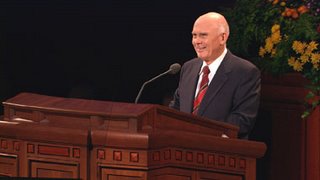Okay, class. These are my initial impressions: brilliant, inspiring, and... depressing.

The book is not depressing in itself, but because I cannot help but keep thinking: "Why, oh, why could we never have anything like this in Sunday School? Why do we spend so much time and effort on fluff? (And I don't mean the lovely marshmallow spread you can only get back East.)
What do we get in SS? (Not, by the way, auspicious initials.)
1) Brief overview of some text.
2) "Personal interpretation" of the text from teacher and class-members.
3) Debate about the value and credibility of these "interpretations," most of which are worthless, as the laughable exegesis in which we, as Mormons, engage draws on nothing but the KJV text and whatever we make up. No cultural understanding, no textual criticism; most class-members didn't even read the text before coming to class.
4) Invariably, the interpretation we settle on as valid is the one that corresponds most exactly with the Mormon practice
du jour, because, of course, the way we do things today is representative of the actual personal opinion of deity; that is, we have finally "arrived" as an institution. No further thought or innovation is necessary: sorry, Gordon. Please maintain the status quo.
5) Flaccid application to our lives. Acceptable as long as we do not need to really live the law of consecration. It is a lovely plan, but really, the Lord
wants you to have that boat/car/house. We love the honeyed flavor of scripture; we just won't accept what makes our bellies bitter.
6) Obligatory "testimony." Tears are a plus (and a sign of truth).
7) Pat yourself on the back! We are the one true church, and no one else has anything to offer!
Buy the Pope's
book. You won't regret it. You can even find time to read it in Sunday School; after all, you've got nothing better to do.









